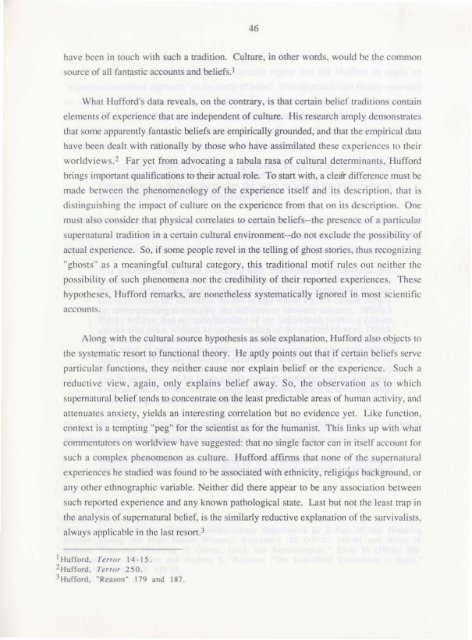Untitled - Memorial University's Digital Archives - Memorial ...
Untitled - Memorial University's Digital Archives - Memorial ...
Untitled - Memorial University's Digital Archives - Memorial ...
You also want an ePaper? Increase the reach of your titles
YUMPU automatically turns print PDFs into web optimized ePapers that Google loves.
have been in touch with such a tradition. Culture, in other words, would be the common<br />
source of all fanlastic accounts and beliefs. 1<br />
46<br />
What Itufford's data reveals, on the contrary, is that certain belief traditions contain<br />
elements of experience that are independent of culture. His research amply demonstrates<br />
that some apparently fantastic beliefs are empirically grounded, and that the empirical data<br />
have been dealt with rationally by those who have assimilated these experiences (0 their<br />
worldviews.2 Far yet from advocating a tabula rasa of cultural determinants, Hufford<br />
brings important qualifications to their actual role. To start with, a clear difference must be<br />
made between the phenomenology of the experience itself and its description, that is<br />
distinguishing the impact of culture on the experience from that on its description. One<br />
muSt also consider that physical correlates to certain beliefs··the presence of a particular<br />
supernatural (radition in a cenain cultural environment··do nOt exclude the possibility of<br />
actual experience. So, if some people revel in the telling of ghost stories, thus recognizing<br />
"ghosts" as a meaningful cultural category, this traditional motif rules Olll neither the<br />
possibility of such phenomena nor the credibility of their reported experiences. These<br />
hypotheses. Hufford remarks, are nonetheless systematically ignored in most scientific<br />
accounts.<br />
Along with the cultural source hypothesis as sole explanation, Hufford ::lIso objects to<br />
the systematic resort to functional theory. He aptly points out that if certain beliefs serve<br />
particular functions, they neither cause nor explain belief or the experience. Such a<br />
reductive view, again, only explains beEef away. So, the observation as to which<br />
supernatural belief tends to concentrate on the least predictable areas of human activity, and<br />
attenuates anxiety, yields an interesting correlation but no evidence yet. Like function.<br />
context is a tempting "peg" for the scientist as for the humanist. This links lip with what<br />
commentators on worldview have suggested: that no single factor can in itself account for<br />
such a complex phenomenon as culture. Hufford affimls that none of the supernatural<br />
experiences he studied was found to be associated with ethnicity, religiQJ.ls background, or<br />
any other ethnographic variable. Neither did there appear to be any association between<br />
such reponed experience and any known pathological state. Last but not the le::lst trap in<br />
the analysis of supernatural belief. is the similarly reductive explanation of the survivalists,<br />
always applic'lble in the last resort. 3<br />
1Hufford, Terror 14·15.<br />
2Hufrord. Terror 250.<br />
3Hurrord. "Reason" 179 and 187.

















